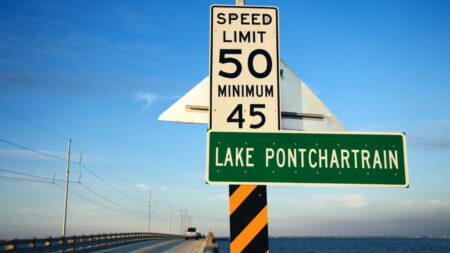F.J. Jimenez/ Getty Images; Illustration by Austin Courregé/Bankrate
Key takeaways
- Virginia drivers are required to carry the state’s minimum insurance coverage or pay the DMV an uninsured motor vehicle (UMV) fee of $500 at every registration renewal.
- The state voted to discontinue its UMV fee as of July 2024, meaning drivers can longer register an uninsured vehicle.
- If you are caught driving without insurance in Virginia, you could face license suspension, a $600 noncompliance fee, a license reinstatement fee and an SR-22 requirement.
- The average cost of a minimum coverage car insurance policy in Virginia is $494 per year.
As of July 1, 2024, all drivers operating their vehicles on public roads in Virginia are required to carry at least the state-mandated minimum amount of liability insurance. Drivers in the state were previously able to pay a $500 fee and drive uninsured, but this policy was overturned by new legislation. Now, driving without insurance in Virginia is illegal. Updates have also been made to Virginia’s laws regarding minimum coverage.
Minimum insurance required in Virginia
The Virginia Department of Motor Vehicles (DMV) requires all drivers to carry minimum liability insurance. When you register a new vehicle, you must comply with state laws by purchasing a policy that carries the following minimum insurance coverage:
- $30,000 bodily injury liability per person
- $60,000 bodily injury liability per accident
- $20,000 property damage liability per accident
This coverage typically reads as “30/60/20” on your policy. Keep in mind that these are just the minimum amounts of coverage. Experts recommend increasing coverage limits to protect yourself financially. Once you’ve signed a policy, you should carry proof of insurance when you drive. Virginia does allow drivers to show electronic proof of insurance.
Virginia used to allow drivers to operate an uninsured vehicle at their own risk with an uninsured motor vehicle (UMV) fee. Since the state discontinued the UMV fee allowance in July 2024, you will face penalties for driving an uninsured vehicle.
Carrying minimum coverage provides some financial protection if you cause an accident. Considering the low average cost of insurance in Virginia — $635 per year for minimum coverage, as of April 2024 according to premium data from Quadrant Information Services — this type of insurance can be appealing. However, minimum coverage will not typically cover the damage to your own vehicle or person after an accident where you are found liable.
New car insurance laws in Virginia
It’s worth noting that Virginia recently passed a law that requires all drivers with a registered vehicle to purchase the state minimum liability insurance. Proponents of the law argued that the bill will reduce the number of uninsured drivers on Virginia roads, which could save Virginian drivers money on their car insurance.
Drivers should also be aware that the state’s minimum insurance requirements are scheduled to increase on January 1, 2025, according to a law passed in 2021. For policies that renew on or after this date, the new Virginia insurance requirements will be:
- $50,000 bodily injury liability per person
- $100,000 bodily injury liability per accident
- $25,000 property damage liability per accident
Penalties for driving without insurance in Virginia
If you’re wondering how long you can go without car insurance before being penalized in VA, the answer is not promising. If the police or DMV discover that you’re driving uninsured, you have 30 days to provide proof of coverage. To encourage motorists to only operate an insured vehicle, Virginia imposes strict penalties on uninsured drivers after that period. You can incur expensive fees and even lose your license. Penalties for driving without insurance in Virginia include:
- Paying a $600 noncompliance fee to the DMV
- Obtaining an SR-22 certificate for three years
- Paying a reinstatement fee of $145, if applicable, on your license, registration and plates
- License, license plate, and registration suspension until you obtain insurance
Additionally, insurance companies usually consider a lapse of insurance as a high-risk rating factor. As such, failing to maintain continuous coverage could result in an increase in average premiums.
What is an SR-22?
Although often called SR-22 insurance, an SR-22 is not actually an insurance policy. It is a certificate filed by your insurance company with the state that proves you carry the required minimum car insurance coverage in the state.
Most drivers do not need SR-22s; the document is mainly required for drivers who are in the high-risk category, such as those convicted of a DUI or driving uninsured. Drivers with an SR-22 requirement may need to switch carriers to find one that files SR-22s and will likely pay above-average rates for coverage based on their driving record.
Virginia is also one of two states with an FR-44 requirement for certain high-risk drivers (Florida is the other). An FR-44 is similar to an SR-22, but in addition to proving that you meet minimum coverage requirements, you are required to carry at least double the state minimum amount of liability coverage. Whether you need an SR-22 or FR-44 in Virginia will depend on the severity of your offense and conviction specifics. You can check with the Virginia DMV for more details.
Getting into an accident without insurance
Although the minimum liability limits are designed to cover the other driver if you cause an accident, most insurance agents and financial advisors will suggest that you purchase more coverage than required to get sufficient financial protection. Getting into an accident without any insurance can be detrimental. If you cause an accident resulting in medical expenses or property damage, you could be solely responsible for covering these costs – which can easily climb to thousands of dollars depending on the severity of an accident. The other driver may even file a lawsuit against you.
In addition to the potential financial burden of a lawsuit, the driver of the other vehicle could report the accident to the DMV due to lack of insurance, leading to additional potential fees.
Frequently asked questions
Read the full article here
















